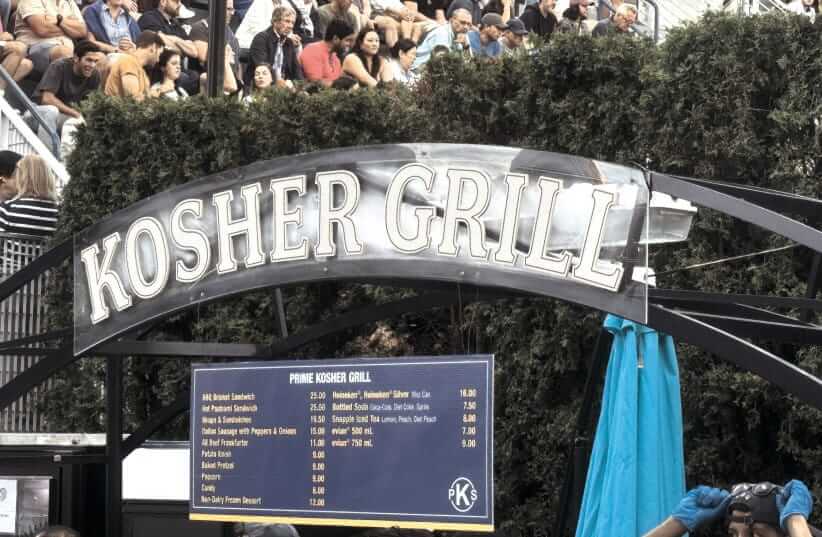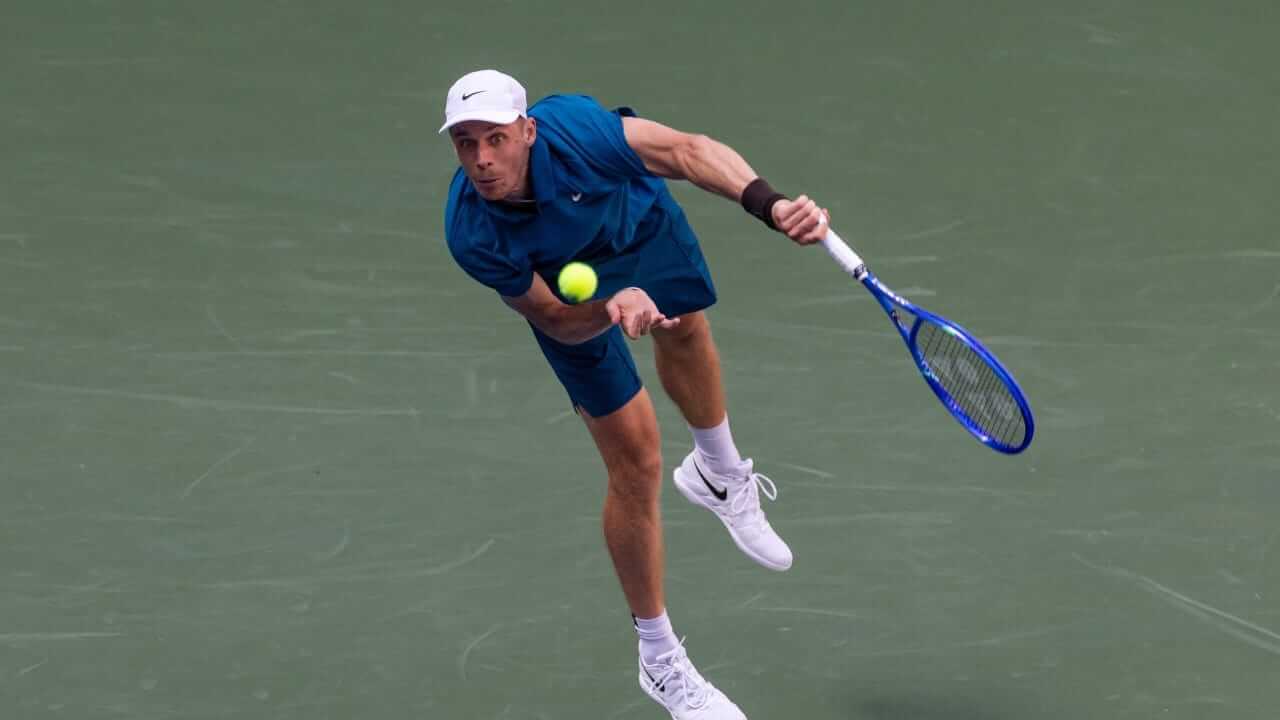At the US Open, identifying players with even the slightest Jewish connection requires inside tips, additional sleuthing, and perseverance.
Originally appeared in The Jerusalem Post, September 2, 2025
There is a bit of an Adam Sandler “Chanukah Song” quality to writing about Israeli and Jewish players at the US Open Tennis Championships. In the famous song, the comedian lists Jewish celebrities with both real-life and fictional connections to Judaism.
At the US Open, identifying players with even the slightest Jewish connection requires inside tips, additional sleuthing, and perseverance. And Jewish fans on the grounds are happy to offer their two cents as they seek to “out” Jews.
Identifying Israelis is easier and obvious as their country appears next to their name, though this year, the only Israelis at the US Open are wheelchair players Guy Sasson and Sergei Lysov, along with junior girl Mika Buchnick.

Jewish players are harder to find, even when more liberal definitions of “Jewish” are used. Madison Brengle (No. 878) of Delaware is Jewish. She lost in the first round of the qualifying tournament.
Mitchell Krueger (No. 186), who made it to the third round of the qualifying tournament before losing, is not Jewish – despite the Jewish-sounding name.
Jewish and Israeli athletes at the US Open
Two Jewish tennis fans approached me at the US Open when they saw the name of Zachary Cohen, competing in the boys’ qualifying tournament. They wondered and hoped that, just maybe, he was Jewish. It is possible that two girls in the girls’ qualifying tournament – Brooke Wallman and Aspen Schuman – may be members of the tribe.
Some players have Jewish and even Israeli connections, though they choose not to incorporate this fact into their overall identities. Taylor Fritz is a case in point. Fritz, ranked No. 4 in the world, is the son of Kathy May, who is the great-great-granddaughter of German Jewish immigrant David May, the founder of the May Department Stores Company, which eventually merged with Macy’s.
Denis Shapovalov, 26, is perhaps the only player in the draw born in Israel. The Israeli and Jewish parts of his identity are not ones he speaks about often.
The hard-hitting Canadian lefty, ranked No. 29, advanced to the third round after a hard-fought, three-hour, 36-minute five-setter versus Valentin Royer of France. While Shapovalov has been known to wear a cross at times in honor of the religion of his Greek Orthodox father, his Jewish mother, Tessa Shapovalova, reportedly considers her son to be Jewish. Denis’s parents came to Israel from the former Soviet Union in the 1990s, and Denis was born in Tel Aviv in 1999. They moved to Toronto, Canada when he was one.
Shapovalov has made an impressive recovery from knee injuries.
“My confidence is very high,” he noted. “I would say it’s different than when I was young and the confidence would be high, but it would be pretty fragile, I would say. I think now – and you can see with my results – that the confidence is there. Even if I have a bad few weeks or unlucky draws or a couple of tough matches, I’m able to bring it back and play at a high level when the next week comes. I think that’s why I have been able to win three titles in less than 12 months, and that’s why I’ve been able to have so many great weeks recently.
“I definitely think that the confidence is there. I’m playing great tennis. Today was not an easy match by any means. It was super high level and very difficult, and I was able to pull through playing some incredibly big tennis, especially in that third set tiebreak there. I think it’s kind of a more solid confidence that I have in myself. I think it comes with age, but also, you know, knowing with the work that I’ve done and the team that I have around me. You know, they’re all putting in 100%. That also brings a lot of stability and a lot of, yeah, confidence in each other.”
Eighteen-year-old Valerie Glozman, making her fourth appearance at the US Open, also has connections to Judaism. The rising Stanford second-year student earned her way into the main draw of the US Open along with five other college students, as a result of her success in this summer’s American Collegiate Wild Card Playoffs. She lost her first-round match versus Dutch player Suzan Lamens 6-4, 6-2.
Glozman, the daughter of a Ukrainian Jewish father and a Taiwanese mother, has reported in the past that she feels her parents have not exposed her enough to either of their religions.
Glozman enjoyed her latest US Open experience.
“Main draw is a dream come true!” she exclaimed. “You are treated like royalty and it’s the coolest experience. But it was also a bit overwhelming for me because I wanted to do the best I could on the court and so I was putting a lot of pressure on myself leading up to the match. There was also just a lot going on that I am not used to being a part of. All in all, a wonderful experience but just a lot of new things all at once.”
With her early departure from the tournament, she is heading back to Stanford in time for the start of the semester.
“I’ve loved the college experience so far. Tennis can be a lonely sport as it’s so individual, so it’s really nice to be surrounded by an amazing, supportive team. Everyone I’ve met at Stanford is incredibly welcoming and down to earth, so it’s been a ton of fun socially. Academics can be tough to balance, especially with all the travel, but all of my teammates are motivated so we find time to study together on the road. I’m always learning to manage my time better but I have no complaints about my experience so far.”
Oliel’s memorable run
In 2016, Yshai Oliel of Israel and Zizou Bergs of Belgium reached the semifinals of the US Open juniors doubles championship.
Nine years later, Oliel is recently married, recovering from wrist surgery, and ranked No. 1568 after reaching a high of No. 305 in 2022.
In contrast, Bergs is No. 48 in the world and has advanced to the second round of the US Open. He has always spoken fondly about Oliel, admitting he always felt Yshai would have gone farther than him professionally.
“He was a helluva player, so his future looked better than mine,” Borges told The Jerusalem Post about Oliel this week in the US Open Media Center. He was also younger and was playing better than I was. He was rock solid, and I was still a lot in the process of figuring out how to play and was developing a lot of things. Yshai was very steady and mature in his game.”
He pondered the question of why Yshai hasn’t reached a higher ranking.
“It is also a transition period between juniors and going to the pros, and how you handle that. And he has had some injuries in his path. A lot of those things can go wrong, and maybe I’ve just been a little luckier than him. It is tough to say.”Wheelchairs and juniors in action this week.
Junior Mika Buchnik will be in action when the junior tournament is underway from August 31 to September 6. Guy Sasson and Sergei Lysov will compete from September 2 to 5 in the US Open Wheelchair Championships.
Kosher stand, minyans, and free Fage yogurt
For fans looking for experiences other than speculating on the Jewish status of players, a kosher stand is open for day and night sessions, with the exception of Friday evenings and Saturdays. Afternoon and evening minyanim (prayer services) are offered next to the food cart, near Court 12.
Many packaged snacks, including popcorn and chips, bear kosher certification. The Fage yogurt company, under kosher supervision, has a booth just outside of the Grandstand where those willing to wait in an often long line receive free single-serve portions of yogurt.
